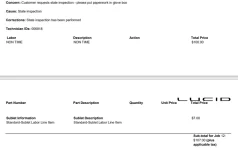1) As a second owner he didn't do it consciously. I understand if he was the first owner and deliberately ignored update notifications. The car even displayed that it is up to date.
I do not think
@rking0122 did anything wrong at all. When I refer to 'the owner,' I have been referring to the original owner the entire time. The only thing
@rking0122 could have done "better" would have been to confirm and ensure that the vehicle was updated to the most recent software before buying the vehicle, but the UI did not show him he was out of date, and thus it would be very hard to argue that he 'should have known better'.
However, the original owner
should have known better, and I have absolutely no idea what transpired between Lucid and that owner.
Unfortunately for
@rking0122, he has inherited whatever the situation was between those two parties, and it appears to have been an unusual one, at the very least. That is not his fault, but that is the situation. The original owner did not follow through on their obligations, as defined in the warranty, to keep the car up to date, or to take it to service (for
any reason, mind you, including the annual maintenance), because if either of those things had happened, the car would be up to date, as that is something the service center does every time they see the car, if there is an update to be installed.
So yeah, this sucks for
@rking0122. He did nothing wrong. It isn't his fault as he did not ignore the update, and inherited this situation by buying a used car from a private party, which you buy as-is. If he had bought it from a dealership, for example, he could potentially go after the dealership for not following through on their obligations to fulfill the warranty and make them pay the $1400, potentially, as dealerships have additional liability and consumers have additional legal protections. But if you buy from a private owner, you're on your own.
I never said
@rking0122 did anything wrong.
2) Is this confirmed by official Lucid sources? My understanding was that if someone didn't update to 2.1.43, regardless of what version they are currently at, it will require TCU replacement. It would be nice to know what is the minimum version car needs to be at in order to manually update at the service center.
It was in the release notes. I don't know if it requires TCU replacement or they can flash it, but it doesn't really matter; in order to get on 2.1.43 if you missed it, service has to do it, whether that is flashing the firmware or replacing the TCU. Replacing the TCU is a quick job (it's not hard to access), and so sometimes it is literally faster to simply swap it and get the car out the door, then flash the old unit later and reuse it.
I have no idea if that's true, but if it is, I would make the same choice - replace it with a current one (because it is easy to access), deliver it back to the customer, then take the hours to update the old TCU.
Of course, that only makes sense if you aren't charging for it anyway, which they aren't doing for people who simply missed 2.1.43.
Something else happened here.
3) In my opinion 30 days is little excessive. I think 90 days would be more reasonable. There could be valid reason that someone could not perform the update within 30 days. For example extended vacation away without access to the car and without remote connection through phone. In that case should I delegate someone to keep checking the car at least once every 30 days when I am away? Long term AWS storage is cheap and company could easily save and store older images unless each image is unique to each individual VIN then I understand the requirement of purging older versions to maintain the cost.
OK, but it doesn't really matter. Again, the number of days is irrelevant in every sense except If Lucid tries to enforce it. Lucid would be cutting off their nose to spite their face if they enforced this simply just to enforce it. It is just a CYA. It could be 24 hours (though that would be unreasonable), and it wouldn't make one iota of difference unless Lucid ever enforced it.
Also, it isn't about saving storage; I'm certain of that. It's just about ensuring that you don't have many cars out there with different versions, and thus different bugs, and if you have to change something server-side, you don't want outdated versions out there that may be incompatible now (like if a TLS cipher gets broken, for example), etc.
It's just a CYA clause. That's it.

